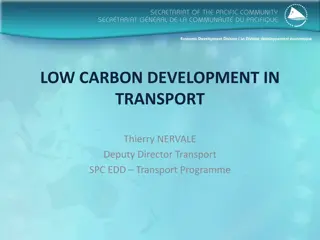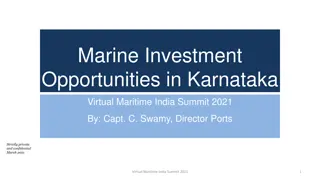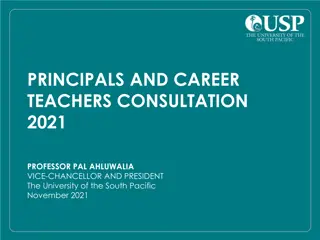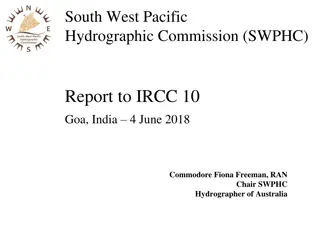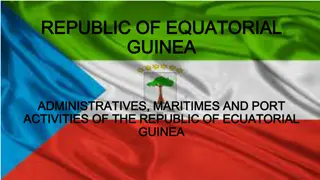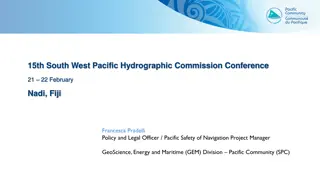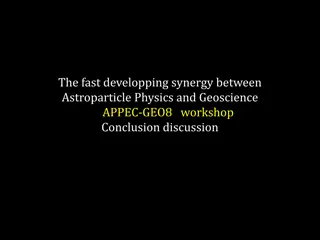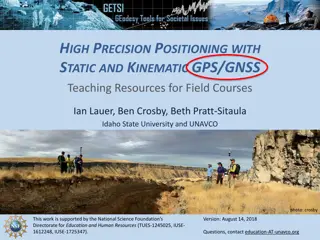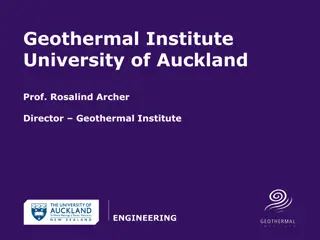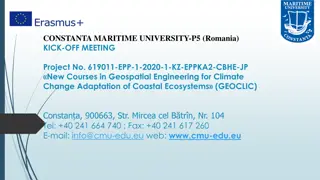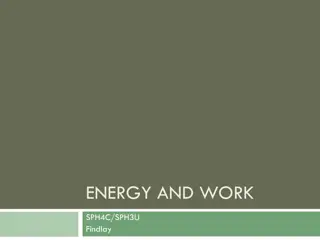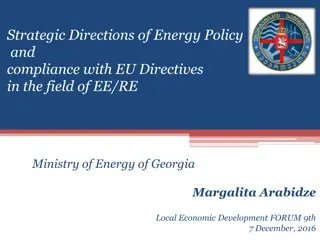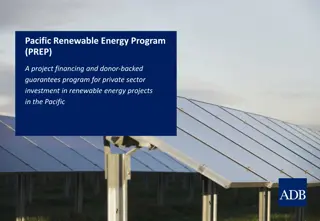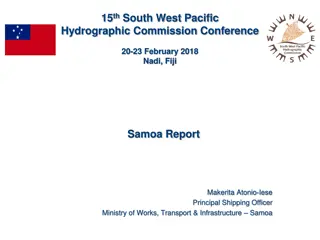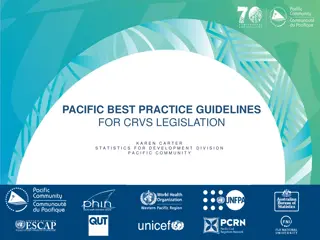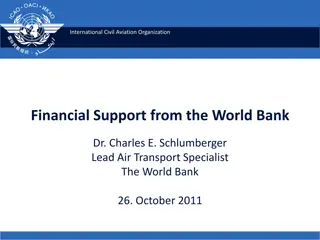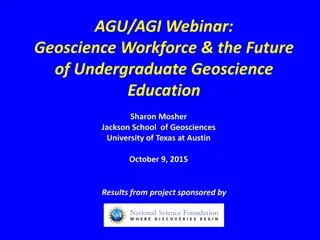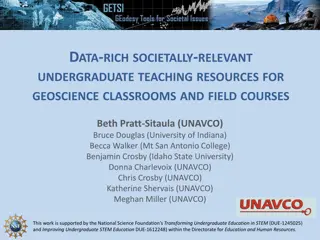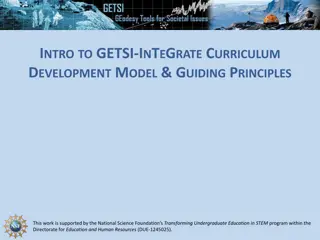Enhancing Sustainable Development in the South-West Pacific Through Geoscience, Energy, and Maritime Initiatives
The 15th South West Pacific Hydrographic Commission Conference held in Nadi, Fiji focused on advancing policies for safe navigation and project management in the Pacific. The GeoScience, Energy, and Maritime Division of the Pacific Community (SPC) highlighted its mandates and strategic priorities, particularly in disaster resilience, ocean development, and energy sustainability. The new GEM Division outlined areas of focus such as policy governance, disaster readiness, and capacity building. This aligns with the UN goals for sustainable oceans and the Blue Economy concept, emphasizing integrated solutions for ocean conservation and responsible resource use.
Download Presentation

Please find below an Image/Link to download the presentation.
The content on the website is provided AS IS for your information and personal use only. It may not be sold, licensed, or shared on other websites without obtaining consent from the author. Download presentation by click this link. If you encounter any issues during the download, it is possible that the publisher has removed the file from their server.
E N D
Presentation Transcript
15th South West Pacific Hydrographic Commission Conference 21 22 February Nadi, Fiji Francesca Pradelli Policy and Legal Officer / Pacific Safety of Navigation Project Manager GeoScience, Energy and Maritime (GEM) Division Pacific Community (SPC)
BACKGROUND SPC Economic and Development Division (EDD) and SPC Geoscience Division (GSD) mandates SPC Strategic Plan 2016-2020 SPC prioritization process
NEW GEOSCIENCE ENERGY AND MARITIME (GEM) DIVISION Areas of Scientific Programming Policy and Governance (Organisational Competencies) Disaster and Community Resilience Sustainable Development of Oceans and Maritime Technical Support for Geo resources and Energy Implementation of (Risk) Assessments Data & Information Focus Areas Training and Capacity Building Crosscutting Activities Programming, Performance and Systems
NEW GEOSCIENCE ENERGY AND MARITIME (GEM) DIVISION Focus Area Definition Oceans and Maritime Driving growth in blue economies through well informed and inclusive action from integrated solutions for ocean and coastal management and maritime transport. Georesources and energy Strengthening the management of earth s non-living resources through responsible harnessing of mineral resources including metalliferous and development minerals, and clean and renewable energy resources such as solar, wind, and geothermal, for sustainable development. Disaster and Climate Resilience Strengthening resilience and adaptive capacitythrough better understanding, management and reduction of risk, enabling integrated action on climate change adaptation, disaster risk reduction, integrated natural resource management, and access to safe and secure water and sanitation. Divisional Programing, Performance and Systems Driving integrated programme excellence and operational support across the division and fully aligned to the broader requirements of SPC.
OCEANS AND MARITIME PROGRAMME CONTEXT The future we want from the United Nations Conference on Sustainable Development Rio+20 makes reference to oceans and seas throughout 19 paragraphs (from paragraph 158 to 177). Sustainable Development Goals (SDGs) of the 2030 Agenda for Sustainable Development, and particularly the Goal 14: conserve and sustainably use of the oceans, seas and marine resources. The United Nations Conference to Support the Implementation of Sustainable Development Goal 14 of the 2030 Agenda from 5-9 June 2017 affirmed a strong commitment to conserve and sustainably use our oceans, seas and marine resources for sustainable development. The document reaffirms the need for implementing international law as reflected in the United Nations Convention on the Law of the Sea (UNCLOS). Concept of Blue Economy
List of GEM Objectives and Results Pillar 1- Oceans and Maritime Pillar 2 - Georesources and Energy Pillar 3- Disaster and Community Resileince Pillar 4- Programming, Performance and Systems Outcome: Good Oceans and Maritime Governance Outcome: Effective Geo-resources and Energy Policy and Governance Outcome Effective DRM, WASH and climate change Governance and coordination Outcome: Strong engagement by members in GEM programmes and closer collaboration between GEM and its partners, which enhances the relevance and effectiveness of SPC s work. Result 1.1: Strong leadership, good governance, effective multi sectoral coordination and partnerships for GEM Result 1.1: PICTs laws and policies comply with international maritime instruments Result 1.2: PICTs establish their maritime zones and meet international responsibilities Result 1.1: PICTs Adopt and use regional frameworks for geo-resources and energy Result 1.1: DRM, WASH and Climate Change governance and coordination is improved through adopted and implemented policies and plans Policy and Governance Result 1.2: PICTS develop, adopt and implement National Policies and laws for georesources management and sustainable energy Result 1.2: Response to disaster and climate change is strengthened through strategic resourcing and national mechanisms aligned with FRDP Outcome: GEM's scientific and technical expertise is further enhanced to increase the relevance and effectiveness of its work in supporting achievement of members development goals Result 1.3: Strengthened coordination and partnership management to support increased institutionalised governance Result 2.1: GEM operates with a strategic focus adding value to its members through up to date expertise and relevant and effective services
Outcome Applied science, technology and applications for improved community resilience to climate change Result 2.1: Tangible actions are implemented for community resilience through demonstration pilots and scaled up initiatives Result 2.2: Infrastructure planning and development in PICTs is supported by disaster, climate and WASH technical assessments Result 2.2: Operationalise and increase capacity development, knowledge management and innovation Result 2.3: Enhance data management across all GEM pillars Outcome: Quality Technical Assessment and Data & Information in Geo-resources and Energy Result 2.1: Infrastructure planning and development in PICTs is supported by technical surveys Outcome: Sustainable Maritime Transport and Safe Navigation List of GEM Objectives and Results Result 2.1: PICTs domestic vessels shipowners adopt and implement safety standards and Safety Management Systems (SMS) Assessments and Data & Information Outcome: Enhanced, evidence-based, multi- disciplinary approaches to the design and implementation of programmes addressing national and regional development issues (including the analysis and prioritisation of responses to social, environmental and economic issues). Result 2.2 PICTs supported with technical assistance for improved energy efficiency and strengthened sustainable energy industry Result 2.2: PICTs have the capacity and systems to deliver safety of navigation services in line with international maritime instruments Result 3.1: Institutionalisation of evidence- based, and multi-disciplinary project management procedures and systems which adheres to SPC policy and procedures and utilities a user friendly project management system and which links paper work from admin/ procurement/ finance Result 2.3: PICTs capacity, systems and tools for data collection and analysis, dissemination in georesources and energy is improved and supported by functional secure regional and national data repositories Result 2.3: Strengthened knowledge management systems and research are accessible for regional, national and community planning and resilient development Result 2.3: PICTs improve energy efficiency and lower carbon emissions in maritime transport Result 3.2: Improved synergies and integrated programming across GEM supported by Programming, Performance and Systems Outcome: An enhanced divisional performance management system is implemented, which strengthens the alignment between planning, prioritisation, evaluation, learning and communication and improves the effectiveness of SPC s work with members. Outcome: Strengthened Ocean and Coastal Monitoring and Prediction Services Result 2.4: PICTs have improved ocean services and marine meteorology capacity Result 4.1: Innovative performance management systems and procedures in place that encourage transparency, critical- thinking, self-assessment, openness to change leading to continual improvement Result 2.5: PICTs use ocean and coastal data and assessments to support science-based decision- making
Ouctome: Improved Ocean and Maritime Literacy and Capacity Outcome: Capacity Development in Geo-resources Management and Sustainable Energy Outcome improved capacity in response to disaster and climate change Result 4.2: GEM Monitoring, Evaluation and Learning processes and culture is embedded and effective Result 4.3: Sustainable GEM Resource mobilisations to support all GEM pillars Training and Capacity Building Result 3.1: Skills, practices and certification are improved in PICTs communities and governments for disaster, climate resilience and maintenance of ecosystem services Result 3.1: Expertise, skills and knowledge is improved for professionals in the maritime and ocean-related sectors Result 3.2: Women and youth have increased awareness and participation in the maritime and ocean-related sectors Result 3.1: Skills, knowledge and practice is improved for PICT personnel responsible for energy and georesources Result 3.2: Women and Youth have increased awareness and participation in all initiatives related to DRM, climate change, WASH and ecosystem services Result 4.4 Enhanced and resourced GEM visibility communication and brand Outcome: An efficient Divisional culture championed by motivated and committed staff. Enhanced Divisional support services and improved financial and risk management that underpin efficient service delivery and organisational sustainability Result 3.2: Women and youth have increased awareness and participation in the energy and georesources sectors Result 5.1: Productive organisational culture that promotes staff wellness and ensures operational efficiency and sustainability Result 5.2 Staff development plans which are resourced (time and finances) and supported by manager and include staff empowering training Result 5.3 Effective balance of support services that are resourced between the centralised GEM units and decentralised programme/project units
OCEANSAND MARITIME PROGRAMME (AREASOFINTERVENTIONANDMAIN ACTIVITIES) Policy and Governance Regional maritime boundaries and protected marine areas establishment Science-based ocean and coastal policy and governance support and advice Regional coordination and support to national coordination of the maritime sector Partnership Desk support for the Pacific Geospatial and Surveying Council (PGSC) Assistance for maritime policy, legal and institutional frameworks development under UNCLOS Preparation and assistance towards the International Maritime Organization (IMO) audits under IMSAS Regional Frameworks / Strategies Good Ocean and Maritime governance SDG 14.c SDG 14.c for coordination and synergies with other SPCs Divisions and Programmes in Oceans Science, Programme Focal Point contributes to Pacific Community Centre for Ocean Science (PCCOS) Lead on: Framework for Action on Transport Services (FATS) Technical support through systems development, audits and reviews in maritime administrations, ports and maritime training institutes Domestic ship safety Sustainable maritime transport through pilot-projects Technical support at national and regional level to the Central Pacific Shipping Commission (CPSC) Safe navigation through technical, legal and economic assessment, risk assessment including Maritime Search and Rescue, AtoN and Hydrographic services (Risk) Assessments and Data & Information Regional Strategy on Safety of Navigation (SoN Strategy) Sustainable Maritime Transport and Safe Navigation Governance and Management Pacific Geospatial Surveying Council Strategy (PGSC Strategy) SDG 14.c SDG 14.c Marine, coastal science & survey Protected marine areas management Coastal resilience building Science-based hazard and risk assessment particularly in shoreline and coastal zones Marine spatial planning Pacific sea level monitoring Marine and ocean forecasting services Pacific Ocean Portal (POP) & tide calendars SDG 14.a SDG 14.a SDG 14.5 SDG 14.5 Strengthened Coastal and Ocean Prediction and Monitoring Services Contribute to: Framework for a Pacific Oceanscape (FPO) Training and Capacity Building Framework for Resilient Development in the Pacific (FRDP) Goal 2 Support to maritime training institutes to align with international and national obligations Niche trainings (include marine pilots, port safety & security, maritime law, etc.) where no capacity in-country Gender equality through Women in Maritime network support Improved Ocean and Maritime Capacity Development and Scientific Research SDG 14.c SDG 5.5 Pacific Islands Meteorological Strategy (PIMS) Maritime energy Training and capacity building on the POP, oceanography and ocean science Ocean information and knowledge products and decision making tools and communicating science for public understanding and application Marine scientific research and technology transfer



